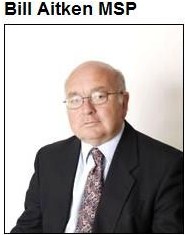
Bill Aitken resigned from Scottish Parliament in February. (Credit: Scottish Parliament)
A Scottish Parliament member resigned after the newspaper the Sunday Herald published his controversial comments about recent rapes. In the aftermath of the comments, there’s been a debate between a journalist and the Herald over whether the comments in question were off-the-record.
Scottish online newspaper the Caledonian Mercury’s Hamish Macdonell questioned the ethics of the Herald in its reporting on Tory member of Scottish Parliament Bill Aitken, which led to Aitken’s resignation.
Aitken resigned Feb 21. In the interview (full transcript of the interview with Aitken here), Aitken “suggested that the victim of a recent gang-rape may have been a prostitute, and said ‘there’s a lot more to these city-centre rapes than meet the eye’. Later in the interview he laughs while discussing how far the woman was dragged,” New Statesmen summarized.
The interview was published in the Feb. 13 Sunday Herald. According to the Herald, “Aitken denied making [the comments] until he read a transcript of the conversation.” Aitken did apologize for the comments in a statement, which reads:
“I did not intend to imply that the circumstances of any victim in any assault in any way lessens the horror or severity of the crime. I would have deep regret if that was portrayed as the case and apologise unreservedly to her, her family and friends for any such misconception.
“Rape, in every case, is an abhorrent violation and must always be prosecuted with the full vigour of the law.”
Macdonell clearly stated that given Aitken’s comments, Aitken “was right to resign.” But, how the newspaper got those comments didn’t seem to be OK, according to Macdonell.
In response, the newspaper defended its work and criticized Macdonell.
Macdonell called the Sunday Herald and its reporter Matthew Holehouse “dubious” and suggested that it used “entrapment” and violated journalsim standards to get the comments. Macdonell compared it to the Telegraph’s undercover reporting last year in which it recorded several Parliament members making controversial remarks. One of the MPs, Vince Cable, was removed from his post as head of media policy as a result.
According to Macdonell, “It is quite apparent from the transcript that Mr Holehouse is very unsure both of what has happened and of normal legal restrictions. He has to be reminded by Mr Aitken that the alleged offence is indeed an alleged offence. He also appears unable to confirm some of the simplest details of the case.”
Two controversial quotes reportedly made by Aitken are:
“Well, it is an area where quite a lot of the hookers take their clients. Now, that may not have happened in this case. But, you know. What was happening? Certainly we cannot have a situation where women are getting dragged off the streets up lanes and raped. Erm, but you know … Are the police saying it is the same outfit?”
“Well, you always know there’s a lot more to these city-centre rapes than meet the eye, of course. But this does sound concerning. So what I will be saying: there is a disturbing pattern, and while the offences may not be related it is absolutely essential that unaccompanied women take the greatest care when walking in these areas. I have little doubt that the police will eventually get a result but it is a disturbing situation nonetheless. OK?”
In Macdonell’s opinion is that Aitken was talking “off the record” until he said “So what I will be saying…” As Macdonell sees it, Aitken was just talking on background until that point.
Macdonnell noted that he called Holehouse, the reporter, to ask him “about the story or the way it had been handled,” but Holehouse didn’t want to talk on the record.
Based on Macdonell’s beliefs about the interview, he commented:
“I believe there are two key issues here. The first is this: should Mr Aitken be held responsible for comments he made in an off the record exchange with a journalist? The Sunday Herald and Mr Holehouse believe he should be, which is why they published details of Mr Aitken’s remarks and started the furore which led to his resignation.”
Macdonell also published a response from Sunday Herald’s Richard Walker criticizing Macdonnell’s story for being “based on a number of false assertions and dubious conclusions.”
Walker asserted there was no “off-the-record” agreement. “At no time were the words ‘off the record’ uttered during the course of the conversation,” Walker stated. He went on to strongly criticize Macdonell’s suggestion that the Herald should have considered the comments off the record.
Walker wrote:
“In other words, journalists should assume that everything is off the record until an interviewee specifically says that he or she is going on the record. We don’t know of any journalist who works under that assumption. Does Mr Macdonell?
“The relationship between journalists and politicians described by Macdonell is dangerously cosy and does a disservice to readers. We could go on to question why the Aitken story was picked up by so few newspapers and broadcasters and why even now so many commentators are bending over backwards to support Mr Aitken’s nonsensical suggestion that his comments do not reflect his true views. But perhaps it is best not to go there …”
iMediaEthics is writing to both the Mercury and the Herald for comment and will update with any response.






